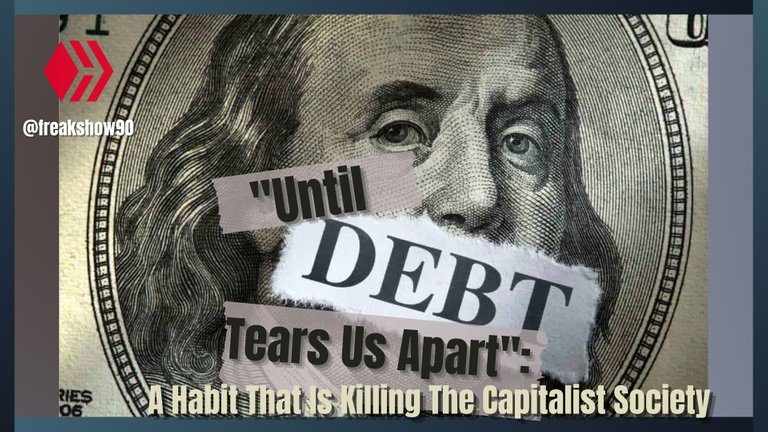

Before developing this post, I would like to propose a didactic mental exercise. And yes, I speak in the first person singular, to make it more intimate. Let's see, how many times have you thought about the way of life you lead? How many times have you been distressed by the fact that "you haven't done anything with your life"? Or, even more recurrently, how many times have third parties defined you by your possessions or your socio-economic status? Yes, I know. These are difficult, uncomfortable and probably hard questions. But this post is precisely about a Darwinian aspect that defines capitalist society. A vice that has spread like a virus and that, simply in time and space, is impossible for everyone to fulfil. Uncontrolled capitalism, financial debt and unhappiness, sound familiar?
Antes de desarrollar este post, quiero proponerte un ejercicio mental didáctico. Y sí, hablo en primera persona del singular, para hacerlo más íntimo. A ver, ¿cuántas veces te has puesto a pensar en el modo de vida que llevas? ¿Cuántas veces te ha angustiado el hecho de que "no has hecho nada con tu vida"? O, aún más recurrente: ¿cuántas veces, terceras personas, te han definido por las posesiones o tu nivel socioeconómico? Sí, lo sé. Son preguntas difíciles, incómodas y seguramente duras. Pero este post trata, precisamente, de un aspecto darwiniano que define la sociedad capitalista. Un vicio que se ha expandido como un virus y que sencillamente en tiempo y espacio, es imposible de cumplir para todos. Capitalismo descontrolado, deuda financiera e infelicidad, ¿te suena familiar?


The banking and financial system is almost 650 years old. It is nothing new. Therefore, indebtedness, too, is just as old. Supposedly, the system of lending and holding money was born to organise and manage material goods well. But historically, epoch after epoch, there has been one constant that has failed to spread. The first: debt. It is assumed, always understanding this concept from the point of view of capitalism, that the generation of wealth lies in the free commercialisation of products, with no state intervention. However, nobody ever foresaw that wealth is not created out of nothing. Therefore, if you want to expand, you must necessarily capitalise. But if you have no money, what should you do? Exactly, borrow, get into debt.
Secondly, inflation. It is predictable, cyclical, disproportionate, but above all, irreplaceable. It is madness. Because, it's exactly like catching a virus. If you have a flow of money, whether in a centralised bank or not, the simple fact of having money (issuance) inexorably causes the scourge of inflation to appear. Inflation, which can be controlled to a greater or lesser extent, but which is always a risk for savers everywhere. Since the value of money (which is linked to inflation and the power of the currency) is at risk, it loses its strength. This leads to the need for more debt, and the cycle of crisis begins. It is a system (capitalism) that is clearly not perfect. But above all it is a suffocating vice.
El sistema financiero y de bancos, tiene casi 650 años. No es nada nuevo. Por tanto, el endeudamiento, también esa misma cantidad. Supuestamente, el sistema de préstamos y retenciones de dinero, nació para organizar y administrar bien los bienes materiales. Pero históricamente, época tras época, ha habido una constante que no se ha podido diseminar. La primera: la deuda. Se supone, siempre entendiendo este concepto desde el capitalismo, que la generación de la riqueza está en la comercialización libre de productos, con nula intervención estatal. Sin embargo, nadie previó jamás, que la riqueza no se crea de la nada. Por tanto, si deseas expandir, necesariamente debes capitalizarte. Pero, si no tienes dinero, ¿qué debes hacer? Exacto, pedir prestado, endeudarte.
En segundo lugar, la inflación. Es predecible, cíclica, desproporcionada pero sobre todo, insustituible. Una locura. Porque, es exactamente igual a contraer un virus. Si tienes un flujo de dinero, bien sea en un banco centralizado o sin él, el simple hecho de tener dinero (emisión) hace que inexorablemente aparezca el flagelo de la inflación. Misma, que se puede controlar en mayor o menor medida pero que siempre es un riesgo para los ahorristas de todo el mundo. Ya que el valor del dinero (que está ligado a la inflación y al poder de la moneda) queda en riesgo, y pierde su fuerza. Lo que provoca la necesidad de endeudarse más, y el ciclo de crisis comienza ¿Lo ven? Es un sistema (el capitalista) que claramente no es perfecto. Pero sobre todo es un vicio asfixiante.
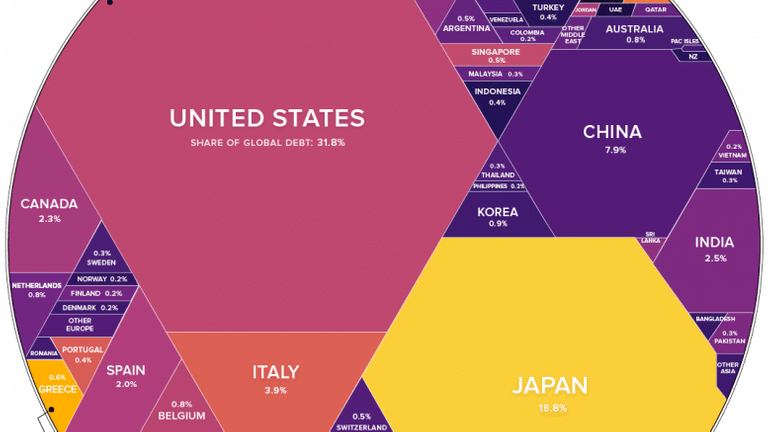
Now, if we transfer the theoretical and economic aspects that create debt as a phenomenon to the daily side; to everyday life, we will see that it is linked to an aspect of overcoming/survival that Western societies have had since the Industrial Revolution. Each generation has the obligation to surpass the generation that preceded it in economic, consumerist and materialistic terms. Regardless of the historical context, the level of stability of the economy, education or even wars or conflicts. What is certain is that there is this obsession/anxiety between "being someone important" and "having a lot of money". Moreover, there are even studies that reflect this strange human mental behaviour.
Ahora bien, si trasladamos los aspectos teóricos y económicos que crean la deuda como fenómeno, hacia el lado diario; hacia la cotidianidad, veremos que está ligado a un aspecto de superación/supervivencia, que las sociedades occidentales han venido teniendo desde la Revolución Industrial. Donde cada generación, tiene la obligación de superar en términos económicos, consumistas y materialistas, a la generación que le precedió. Sin importar el contexto histórico, el nivel de estabilidad de la economía, la educación o incluso, las guerras o conflictos. Lo cierto es que existe esta obsesión/ansiedad entre "ser alguien importante" y "tener mucho dinero". Es más, incluso hay estudios que reflejan este extraño comportamiento mental humano.
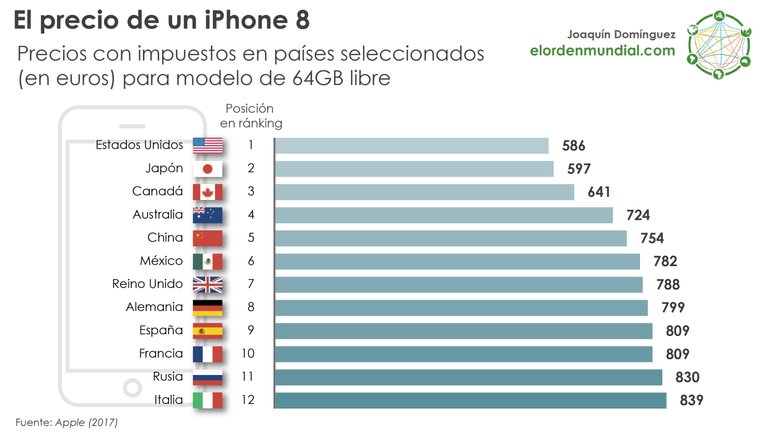

Pavlov, that enormous Russian researcher, who became world famous for demonstrating the theory of conditioning, would agree that the way human beings conceive of money is clearly indoctrinating. That is, it is linked to how you were brought up, where you come from, or how you take on the cost of living. To go no further, in the United States, in the last mid-term elections, the number one concern of Americans, beyond violence, corruption of institutions, growing racism throughout the country, and above all, backtracking on women's rights (abortion ruling reversed by court decision); was inflation and the economy Why? Because first they show off, then they exist?
It's insanity. We would need 400 Earth planets if we could all go into debt as some countries in the world do. Let alone China, which is the parent company of the whole world. And which is the debt creditor of almost the entire African continent, Latin America and developing countries in Southeast Asia. In other words, a handful of nations, and therefore society, dominate at will and pleasure the destiny of production, economy and above all financial security of the rest of humanity. Think about it, the future of any savings you or your relatives may have, is directly related to the governmental decisions of presidents, prime ministers or kings all over the world.
Pavlov, aquél enorme investigador ruso, que se hizo mundialmente famoso por demostrar la teoría del condicionamiento, estaría de acuerdo con que la manera en cómo el ser humano concibe el dinero es claramente adoctrinante. Es decir, está ligada a cómo fuiste criado, de dónde provengas, o cómo asumes el costo de la vida. Para no ir más lejos, en Estados Unidos, en las últimas elecciones de medio término, la preocupación número uno de los estadounidenses, más allá de la violencia, de la corrupción de la instituciones, del creciente racismo en todo el país, y sobre todo, de retroceder en materia de derechos de las mujeres (sentencia sobre el aborto revertida por decisión judicial); era la inflación y la economía ¿Por qué? Porque primero ostentan, luego existen...
Es una demencia. Necesitaríamos 400 planetas Tierras si todos pudiéramos endeudarnos como lo hacen en algunos países del mundo. Ni hablar de China, que es la casa matriz de todo el mundo. Y que es acreedor de deuda de casi todo el continente africano, latinoamérica y países del sudeste asiático en vías de desarrollo. Dicho de otro modo, un puñado de naciones, y por tanto, sociedad, dominan a placer y voluntad el destino de producción, economía y sobre todo seguridad financiera, del resto de la humanidad. Piénselo bien, el futuro de los ahorros que hayas podido tener, tú o tus familiares está directamente relacionado por las decisiones gubernamentales de los presidentes, primeros ministros o reyes en todo el mundo.
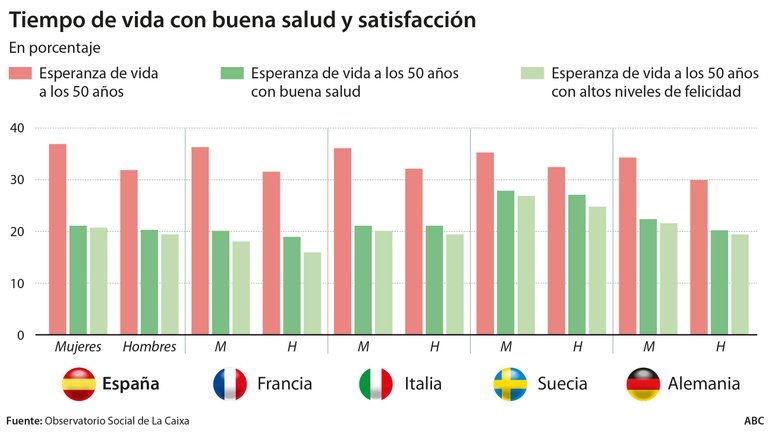
This explains why crises are like waves. They come and go. If there is one thing the economy has shown us, it is that it is not stable. It is completely catastrophic and always creates multi-billionaires out of thin air. Individuals, corporations, or conglomerates, who out of nowhere seem to be "privileged with the gift of timing". Something, for example, that Bitcoin or cryptocurrencies, with the Blockchain system, were able to counteract. Similarly, the unhappiness of consumption lies in the absurd way we all behave. Where we all want everything, all the time, everywhere. We buy models of societies we can't emulate and then use social media to feed that anxiety and disgust.
Esto explica, que las crisis sean como olas. Van y vienen. Si hay algo que la economía nos ha demostrado, es que no es estable. Es completamente catastrófica y que siempre crea multi billonarios de la nada. Personas, corporaciones, o conglomerados, que de la nada parecen "estar privilegiados con el don del acierto". Algo, que por ejemplo, Bitcoin o las criptomonedas, con el sistema de Blockchain pudo contrarrestar. De igual modo, la infelicidad del consumo está en la absurda manera de comportarnos que tenemos todos. Donde todos queremos todo, en todo momento, en todos lados. Compramos modelos de sociedades que no podemos emular y luego, usamos las redes sociales para alimentar esa ansiedad y disgusto.
The inefficiency of the capitalist system is not only in its repeated crises. But in selling the marketing of "wealth" as a reach for all. Perhaps this is why, during the Cold War, the Soviet bloc countries consumed the most alcohol and cigarettes. Survival is in itself exhausting, hard, cruel and wearing. It is not a justification for taking refuge in harmful vices, but we cannot just play dumb. One habit that is killing capitalist society is the frustration of being the generation with the least possibilities, money, possessions, financial security, and above all future in human history.
We will be, apparently, much poorer than our parents and grandparents. These differences are widening further. Where only a few (speaking as a percentage of the world) emerge from the circle of poverty and hardship from which they come, to settle in the comfort and development that financial stability offers. Interestingly, the dollar and the English language are two of the most widely spread values on the planet. And yet we still cannot solve the millennium (yes, 21st century) problems of poverty, desertification and scarcity in the world. The inequality caused by the consumerist model, the unhappiness associated with this vicious circle and the destruction of the planet; a madness that continues to grow. And yes, like inflation...
La ineficiencia del sistema capitalista, no sólo está en sus reiteradas crisis. Si no en vender el marketing de "riqueza" como un alcance para todos. Quizá por esto, en tiempos de la Guerra Fría, los países del bloque soviético, eran los que más alcohol y cigarrillos consumían. Sobrevivir es en sí mismo agotador, duro, cruel y desgastante. No es una justificación para refugiarse en vicios nocivos, pero no podemos sólo hacernos los tontos. Un hábito que está matando la sociedad capitalista es la frustración de ser la generación que menos posibilidades, dinero, posesiones, seguridad financiera, y sobre todo futuro de la historia de la humanidad.
Seremos, aparentemente, mucho más pobres que nuestros padres y abuelos. Estas diferencias se amplían más. Donde sólo unos pocos (hablando de porcentaje mundial) salen del círculo de pobreza y dificultades de donde provienen, para establecerse en la comodidad y el desarrollo que ofrece la estabilidad financiera. Curiosamente, el dólar, el inglés, son dos de los valores más esparcidos en el planeta. Tanto dentro de la economía como en la cultura., y con y eso, aún no podemos resolver los problemas del milenio (sí, del siglo XXI) como la pobreza, la desertificación y la escasez en el mundo. La inequidad que provoca el modelo consumista, la infelicidad asociada a ese círculo vicioso y la destrucción del planeta; una locura que no para de crecer. Y sí, como la inflación...
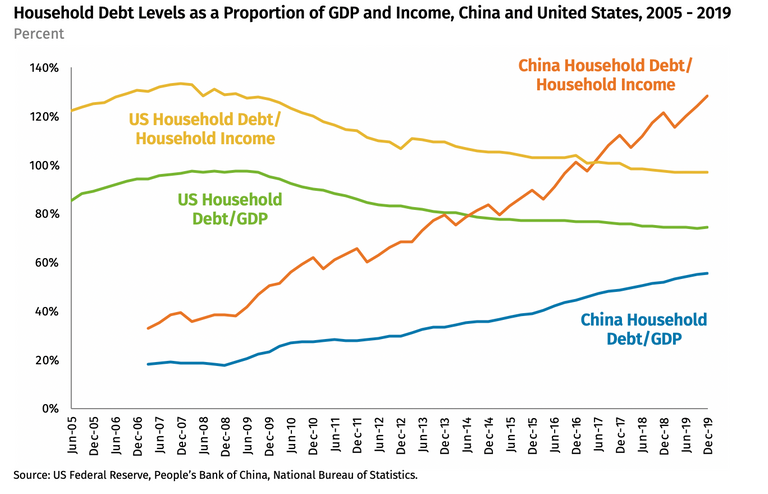

Creo que precisamente esto es una manera moderna de esclavitud. Me pregunto quien o quienes se benefician de esto. La ansiedad por tener más es notoria, y es fácil caer en ella. Justamente creé una colección de posts llamados "apocalípticos" acerca de temas similares:
https://peakd.com/ccc/acont/posts-apocalipticos-distopia-y-realidad-apocalyptic-posts-dystopia-and-reality
Justamente es una crítica válida al capitalismo "existente", el cual no es el mismo que el capitalismo planteado por las criptomonedas el cual que se asemeja más a la teoría de Adam Smith y la Escuela Austríaca.
Excelente post, saludos!
Es que lo que denuncias es la sub consecuencia de las economías de monopolio. El problema es sumamente complejo, establecido y francamente, cómodo para quienes ñan normalizado de este modo desde hace siglos. Puede, y de hecho es así, que los bienes y servicios hayan mejorado y globalizado, pero eso no es indicador de riqueza real. La riqueza real se mide en factores de crecimiento integral de los estratos de una sociedad; no en el nivel de producción de materias primas y sus valor en dólares... Si así fuese, África y casi toda Asia, serían los continentes más ricos del planeta, y claramente esto no es así.
I believe we have reached a critic level these times, maybe worse than 1929, capitalism's destiny is to implode at some point
Well, thing is we haven't reach the prime target of capitalism: welfare. For some, not for most people everywhere...
In some cases, we are losing the welfare built in the years, heart care becoming a rich stuff, no money if you lose job and so on